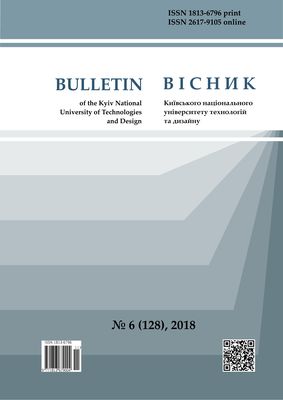DEFORMATION CHARACTERISTICS OF HIGH STRENGTH KNITTED FABRICS
DOI:
https://doi.org/10.30857/1813-6796.2018.6.6Keywords:
industrial knitwear, polyethylene yarn, polyamide yarn, protective products, high- strength knitwear, deformation characteristicsAbstract
Investigation of deformation characteristics of high-strength knitted fabrics produced with the use of polyethylene yarn. Methodology. The article uses an experimental method for the study of knitted fabrics samples in accordance with standard methods. The knitting structure with increased strength characteristics and resistance to the action of negative mechanical effects has been developed and their deformation characteristics have been evaluated. The knitted fabrics are made on double-circular knitting equipment 10 gauge by double-layer structure with press connection of the layers by the main yarn. The polyethylene yarn Doyentrontex linear density 44 tex in pure form and in combination with a polyamide yarn for technical purposes linear density 29 tex have been chosen as a raw material. In order to establish the load value by deformation of knitted fabrics, the indicators of the tensile strength of the knitwear along the wales and courses are determined. It has been revealed that most of the permanent deformation of knitwear for technical purposes, which is subject to large mechanical loads during operation of the product, is within acceptable levels. Originality. Consists in the study of the deformation character and deformation relaxation of high –strength double layer weft knitted fabrics, made with the use of polyethylene yarn. Practical value. Developed knitted fabrics with high strength and resistance to mechanical damagehave sufficient resilience and elasticity, as well as acceptable level of permanent deformation, which allows them to be recommended for the manufacture of a wide range of protective products from mechanical hazards.
Downloads
Download data is not yet available.
Downloads
Published
2019-04-09
Issue
Section
Materials Science. Textile and Apparel Manufacturing

